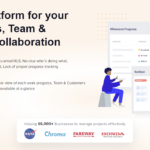What is the best platform to develop mobile application
The success of your application can be greatly affected by the platform you choose, which is an essential decision in the fast-paced world of mobile app development. At WOWinfotech, we recognise how important it is to create creative and user-focused applications by utilizing the best mobile app development platforms. Choosing the right platform is a pivotal decision that can profoundly impact the success of your application. At WOWinfotech, we understand the significance of leveraging the most suitable mobile application development platforms to craft innovative and user-centric applications.
Why WOWinfotech for Mobile App Development?
1. Expertise Across Platforms: Our team of skilled developers is proficient in web-based, cross-platform, iOS, and Android app development, guaranteeing flexibility and proficiency across various platforms.
2. Customized Solutions: We are aware that no two people are the same. We customize our strategy to meet your company's objectives and provide custom solutions that perfectly represent your vision.
3. Cutting-Edge Technology: We keep ahead of the curve by embracing the newest frameworks and tools to deliver creative and secure mobile application solutions.
4. Quality Assurance: Detailed testing procedures ensure that programmes are of the highest caliber, free of errors, and provide remarkable user experiences.
Understanding the mobile app development platforms:
Platforms for mobile app development are settings or ecosystems that make it easier to create, launch, and maintain mobile applications. These platforms provide developers with a range of tools, resources, and frameworks to help them create applications for different mobile operating systems. These are a few important platforms for developing mobile apps:
1. iOS Development Platforms:
– Apple Developer: The official Apple platform offers information, documentation, and building tools for iOS app development. The Fast programming language, the Xcode integrated development environment, and tools for App Store app deployment are all included.
2. Android Development Platforms:
– Google Developers: For Android app development, Google provides tools, an extensive set of APIs, and Android Studio (IDE). Programming languages Kotlin and Java, the Android SDK, and the Google Play Console are available to developers for app distribution.
3. Cross-Platform Development Platforms:
– React Native: It was created by Facebook and allows JavaScript and React to be used in cross-platform app development. It enables developers to use a single codebase to create apps for both iOS and Android.
– Flutter: Google's UI toolkit, which uses the Dart programming language to create natively built apps for a variety of platforms from one code base.
– Xamarin: After being purchased by Microsoft, Xamarin makes it possible to develop cross-platform apps with C# and.NET, allowing code to be shared between iOS, Android, and Windows.
4. Web-Based Development Platforms:
Progressive Web Apps (PWAs): An online strategy that uses web technologies (HTML, CSS, JavaScript) to develop applications that work on various platforms and devices and provide an app-like user experience.
– HTML5, CSS, and JavaScript: Fundamental web technologies for building accessible and responsive mobile applications.
5. Cloud-Based Platforms:
– Developers can concentrate on frontend work by using AWS Amplify and Firebase, which offer backend services, hosting, analytics, and other tools for creating mobile apps.
Every platform offers advantages over the others and meets various needs for development. The choice of platform is affected by variables such as target audience, app complexity, development time, and resources. To produce excellent and user-friendly mobile applications, developers and companies choose platforms that meet the needs of their projects.
Mobile app development frameworks:
Mobile app development frameworks are tools or platforms that provide developers with a structured foundation and set of tools to streamline the development process. These frameworks offer reusable components, libraries, and functionalities that expedite the development process and enable developers to build apps more efficiently. Here are some popular frameworks:
1. React Native:
– React Native is a popular framework for creating cross-platform mobile apps with JavaScript and React that was created by Facebook. It offers near-native speed by allowing developers to create code only once and distribute it on both the iOS and Android platforms.
2. Flutter:
– Flutter is a UI toolkit developed by Google that allows developers to create natively built desktop, web, and mobile applications from a single codebase. It builds attractive interfaces with a huge number of configurable widgets and the Dart programming language.
3. Xamarin:
– Microsoft purchased Xamarin, a cross-platform framework that lets programmers create native C# and.NET apps for Windows, iOS, and Android. It offers a strong programming environment and access to native APIs.
4. Ionic:
– Ionic is a well-liked open-source framework for creating hybrid mobile apps with web technologies including HTML, CSS, and JavaScript. It is built on top of AngularJS and Apache Cordova. It provides a toolkit and collection of UI elements to facilitate quicker creation.
5. PhoneGap / Apache Cordova:
– Using HTML5, CSS, and JavaScript, Apache Cordova is an open-source framework that makes it possible to create hybrid mobile apps. By offering extra tools and plugins, PhoneGap, a Mobile distribution, makes the process of creating cross-platform applications easier.
6. NativeScript:
-Using JavaScript, TypeScript, or Angular, developers may create native apps for iOS and Android platforms with NativeScript. It guarantees excellent performance and a native-like user experience by giving direct access to native APIs and UI elements.
7. Adobe PhoneGap:
– Developers may use web technologies to create cross-platform mobile apps with PhoneGap, which is now a part of Adobe. It makes the process of developing apps easier by giving users access to a variety of tools and plugins.
These frameworks offer diverse degrees of abstraction, usability, performance, and access to native device functionality to meet the demands of different types of developers. A framework's selection is frequently influenced by variables such as project specifications, developer experience, platform support, and intended application performance. In order to build reliable and captivating mobile applications, developers and companies choose a framework that best fits their unique project objectives and limitations.
Factors to Consider:
1. Target Audience:
– Identify your target audience to determine whether iOS, Android, or a cross-platform solution is more suitable for your app.
2. Development Cost:
– Consider the development costs associated with each platform, including licensing fees, development tools, and testing devices.
3. Time to Market:
– Assess the time it takes to develop and launch an app on each platform. Cross-platform frameworks like React Native or Flutter can expedite the development process.
4. User Experience:
– Understand the design guidelines and user experience principles specific to each platform to ensure your app aligns with user expectations.
Conclusion:
A major choice that might affect your application's success is selecting the best platform for developing mobile apps. WOWinfotech is a reputable app development firm with the know-how and adaptability to realize your mobile app idea, regardless of your preference for iOS, Android, or a cross-platform solution. To begin the process of developing a unique mobile application, get in touch with WOWinfotech right now for a consultation.
Feel free to contact WOWinfotech for any inquiries, collaboration opportunities, or simply to share your thoughts at info@wowinfotech.com or call at +91 9370104077. We value your feedback and look forward to connecting with you!
Report Story



